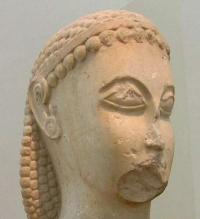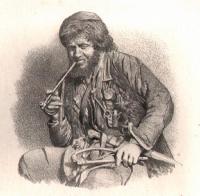Войти Создать учётную запись

Грузины
#3

 Опубликовано 06 Декабрь 2021 - 18:55
Опубликовано 06 Декабрь 2021 - 18:55

Что интересно по фильму - на Крите есть традиционный способ приготовления копчёного мяса, которое называется похоже - апаки. Там же на Крите очень популярны улитки..
#4

 Опубликовано 06 Декабрь 2021 - 19:26
Опубликовано 06 Декабрь 2021 - 19:26

Я не знал, что первая печатная книга на грузинском была издана в Риме.
Про армян-католиков я знал, как и про арабов-католиков Ливана, а то что есть немного грузин (причём римо-католиков, а не какая-то своя католическая церковь, у как армян или в Ливане) – стало открытием.
I stal sparachnieje ŭščent,
A my tut byli, i my tut budziem,
Pakul isnuje hety śviet.
#5

 Опубликовано 18 Декабрь 2021 - 16:14
Опубликовано 18 Декабрь 2021 - 16:14

Рим грузинов загнал в армянский рит, тоесть грузины слушали богослужение по армянский, грузинам католикам пришлось сделать много усилиев чтобы рим для них подтвердил латинский рит.
Католики как грузины так армяне наиболее армянофобские обшины.
Армяне так и католики занимались торговлей и были конкурентами, армяне в грузинских городах: гори, кутаиси, тбилиси платили грузинскому царю деньги и царь закрывал католические храмы, потом католики платили царю и царь открывал католические храмы, грузины душой были за католиков, но у армян было больше денег, а ето был решаюший фактор.
Был в стамбуле большой и знатный монастырь грузин католиков, он был закрыт после стамбульского погрома 53г, католики разбрелись по другим странам, ныне в стамбуле жывет одна семья католика петре зазадзе.
#6

 Опубликовано 18 Декабрь 2021 - 19:50
Опубликовано 18 Декабрь 2021 - 19:50

Турки в ахалцыхском, трапезунтском и арзрумских пашалыках приследовали грузинскую церковь,
.Вы имеете в виду лазов? Или в этом регионе жили и другие этнические группы?
#7

 Опубликовано 18 Декабрь 2021 - 20:14
Опубликовано 18 Декабрь 2021 - 20:14

Трапезундский вилайет включал и аджарию, и в самом лазистане/лазике грузинская церковь была искоренена в 17в. Последний офийский епископ герман бкжал в россию, в ахалцыхском пашалыке последная православная церковь св.марины была закрыта в 70г 18в. Православные перешли в состояние криптохристиан. В арзрумском вилайете грузины по словам очевидца армянина акоба карнеци приняли ислам в 17в, так как по его словам грузины были землевладелцы а турки запретили христианам владеть землей, испугавшысь грузины приняли ислам а армяне так как были торговцы и ремесленники остались христианами, один англичанин писал что все оседлые турки начиная от арзрума имеют грузинское происхождение, к туркманам и к курдам они относятся с пренебрежением.
Грузинский патриарх не был в подчинии у турок и поетому турки были бескомпромисны по отношению к нрузинской церкви.
Переломным моментом был зохабский мир 1639г между ираном и турцией, после етого турция перестала делать уступки грузинам и потребовала: или ислам или покиньте територию, более половины ушло в свободную грузию, кто остался им был выбор: ислам, католичество или подполье.
За все надо платить, те народы которые думали что с турком можно договорится те заплатили дороже чем мы.
- "Спасибо" сказали: valerios
#8

 Опубликовано 23 Декабрь 2021 - 18:09
Опубликовано 23 Декабрь 2021 - 18:09

- Краки Нифлунг, roaring, Digenis и ещё один пользователь сказал "Спасибо"
#10

 Опубликовано 23 Декабрь 2021 - 20:23
Опубликовано 23 Декабрь 2021 - 20:23

по отцовским линиям различий с другими грузинскими группами мало, но по аутосомам видно что на протижении 300 лет католики роднились более с христианами гражданами турции нежеле с грузинами, а последнии 200лет вместе с католикими армянами создали единую наднациональную обшину.Кстати очень похожи на результаты понтийских греков.
#12

 Опубликовано 24 Декабрь 2021 - 17:00
Опубликовано 24 Декабрь 2021 - 17:00


Я думаю что ето есть кавказский субстрат грузин

Зап.грузинский неолит, на его основе сложылась майкопская культура, вторым компонентом была леилатепинская культура из месопотамии (касситы?)

Тогда как вост.грузины близки к куро араксинскому енеолиту, я думаю что ето ИЕ и хуритский компонент грузин



Сообщение изменено: daster, 24 Декабрь 2021 - 17:34.
- "Спасибо" сказали: Tora_sama и КОВАЛЬ ЛЮДОТА
#13

 Опубликовано 31 Июль 2022 - 12:36
Опубликовано 31 Июль 2022 - 12:36

Род государей Гюрджистана
Евреи — первые среди народов, происшедшие от Немруда. После них — народы дадиани 26 и шавшети этих [вышеуказанных] грузин. Еще позднее — люди Гуриели 27, ачик-баш 28 и мегрел. Все они от евреев, из общины Давида — мир ему! Приняв христианство и чванясь этим, руководствуются Евангелием 29. Все они говорят на двенадцати языках. У каждого свой особый говор. Их совершенно нельзя понять. По их мнению, народы шавшети и дадиани говорят на самом утонченном языке. [185]
Если угаснет род московских царей, из Гюрджистана привезут какого-нибудь бея (князя) и сделают царем. Родовитые это народы 30.
#14

 Опубликовано 05 Сентябрь 2022 - 17:00
Опубликовано 05 Сентябрь 2022 - 17:00

#15

 Опубликовано 18 Сентябрь 2022 - 15:50
Опубликовано 18 Сентябрь 2022 - 15:50

Distance to: Georgian_Samtckhe
0.01429271 Georgian_Laz
0.01621092 Armenian_Hemsheni
0.01802178 Georgian_Kakh
0.02119705 Ahiska
0.02457800 Georgian_Javakheti
0.02544356 Greek_Trabzon
0.02703204 Georgian_Ajar
0.02745179 Georgian_Kart
0.02791105 Turkish_Trabzon
0.03173613 Georgian_Meskheti
0.03323873 Armenian_Syunik
0.03398891 Udi
0.03414272 Armenian_Parspatunik
0.03432982 Georgian_West
0.03525361 Georgian_Imer
0.03589862 Georgian_Lechkhumi
0.03622722 Armenian_Gesaria
0.03681036 Armenian_Erzurum
0.03692294 Georgian_Guria
0.03740841 Armenian_Gurin
0.03977944 Georgian_Ratcha
0.04001056 Armenian_Artsakh
0.04102289 Armenian_Aintab
0.04176499 Georgian_Megr
0.04307601 Armenian_Urfa
Distance to: Georgian_Meskheti
0.01664722 Armenian_Gurin
0.02118252 Armenian_Erzurum
0.02300343 Armenian_Syunik
0.02328992 Armenian_Gesaria
0.02331887 Armenian_Aintab
0.02353031 Turkish_Trabzon
0.02587895 Armenian_Hemsheni
0.02617651 Assyrian
0.02630166 Armenian_Urfa
0.02747174 Greek_Trabzon
0.02766825 Udi
0.02837289 Georgian_Jew
0.02913508 Armenian_Parspatunik
0.03173613 Georgian_Samtckhe
0.03411130 Georgian_Kakh
0.03548731 Georgian_Laz
0.03550510 Turkish_East
0.03696381 Mountain_Jew
0.03760889 Armenian_Artsakh
0.03851964 Georgian_Javakheti
0.03946923 Greek_Central_Anatolia
0.03990131 Ahiska
0.04001138 Greek_Cappadocia
0.04160754 Kurdish
0.04177241 Mountain_Jew_o
#16

 Опубликовано 02 Октябрь 2022 - 09:43
Опубликовано 02 Октябрь 2022 - 09:43


- Skalagrim, Tora_sama, daster и ещё один пользователь сказал "Спасибо"
I1a через несколько столетий будет самой многочисленной гаплогруппой Кавказа
#18

 Опубликовано 02 Октябрь 2022 - 11:46
Опубликовано 02 Октябрь 2022 - 11:46

Интересно близость джавахов с месхами к лазам и кахетинцам
Ето обусловленна армянской примесю?
Distance to: Georgian_Javakheti
0.01913165 Georgian_Kakh
0.02155298 Georgian_Laz
0.02400481 Georgian_Ajar
0.02457800 Georgian_Samtckhe
0.02577761 Ahiska
0.02615790 Armenian_Hemsheni
0.02673020 Georgian_Kart
0.03111056 Georgian_West
0.03167263 Georgian_Imer
0.03225241 Georgian_Guria
0.03408590 Greek_Trabzon
0.03492526 Georgian_Lechkhumi
0.03590647 Georgian_Ratcha
0.03730240 Georgian_Megr
0.03831861 Udi
0.03838723 Turkish_Trabzon
0.03851964 Georgian_Meskheti
0.03988565 Armenian_Parspatunik
0.04147802 Armenian_Syunik
0.04270809 Georgian_NorthEast
0.04280299 Abkhasian
0.04330357 Georgian_Mtiuleti
0.04502936 Abkhasian_Gudauta
0.04521724 Armenian_Artsakh
0.04572519 Georgian_Khevs
#20

 Опубликовано 02 Октябрь 2022 - 12:30
Опубликовано 02 Октябрь 2022 - 12:30

Ну вроде бабушкин род считал себя вышедшым из абхазии, но скорее всего у меня какойто компонент програма прочла как абхазов.
Вобшем в аутосомах видны етнополитические реалии 8в, когда карталинцы были одним целым с аджарцами и месхами а не с кахетинцами.
Distance to: Georgian_Kart
0.01345885 Ahiska
0.01936894 Georgian_Kakh
0.02357326 Georgian_Ajar
0.02408004 Georgian_NorthEast
0.02463538 Georgian_Laz
0.02651402 Georgian_Imer
0.02673020 Georgian_Javakheti
0.02693653 Georgian_Mtiuleti
0.02745179 Georgian_Samtckhe
0.02855604 Georgian_Lechkhumi
0.02936672 Georgian_West
0.03019799 Georgian_Khevs
0.03043656 Armenian_Hemsheni
0.03067687 Georgian_Tush
0.03070365 Abkhasian
0.03075692 Georgian_Guria
0.03093935 Udi
0.03155299 Georgian_Megr
0.03426070 Georgian_Ratcha
0.03476097 Armenian_Gharadagh
0.03560877 Armenian_Syunik
0.03582592 Greek_Trabzon
0.03654663 Georgian_Svaneti
0.04008002 Turkish_Trabzon
0.04104946 Abkhasian_Gudauta
- "Спасибо" сказали: BUM BUM
#22

 Опубликовано 02 Октябрь 2022 - 12:56
Опубликовано 02 Октябрь 2022 - 12:56

Target: Georgian_West_Average
Distance: 0.0250% / 0.02500540
58.9 Caucasus_GEO_CHG
26.6 Anatolia_TUR_Barcin_N
12.3 Levant_PPNB
1.6 Iran_IRN_Ganj_Dareh_N
0.6 Pontic_Steppe_Yamnaya_RUS_Samara
Target: Georgian_Adjaria_Average
Distance: 0.0280% / 0.02797772
52.7 Caucasus_GEO_CHG
27.9 Anatolia_TUR_Barcin_N
13.6 Levant_PPNB
5.2 Iran_IRN_Ganj_Dareh_N
0.6 Pontic_Steppe_Yamnaya_RUS_Samara
Target: Georgian_Guria_Average
Distance: 0.0275% / 0.02747801
59.7 Caucasus_GEO_CHG
23.1 Anatolia_TUR_Barcin_N
16.6 Levant_PPNB
0.6 Iran_IRN_Ganj_Dareh_N
Target: Georgian_Imeretian_Average
Distance: 0.0276% / 0.02759102
57.7 Caucasus_GEO_CHG
27.0 Anatolia_TUR_Barcin_N
11.9 Levant_PPNB
2.9 Iran_IRN_Ganj_Dareh_N
0.5 Pontic_Steppe_Yamnaya_RUS_Samara
Target: Georgian_Javakheti:JVKH1
Distance: 0.0297% / 0.02973435
44.1 Caucasus_GEO_CHG
30.5 Anatolia_TUR_Barcin_N
12.1 Levant_PPNB
11.5 Iran_IRN_Ganj_Dareh_N
1.8 Pontic_Steppe_Yamnaya_RUS_Samara
Target: Georgian_Kakheti_Average
Distance: 0.0241% / 0.02409983
40.6 Caucasus_GEO_CHG
27.0 Anatolia_TUR_Barcin_N
15.0 Levant_PPNB
11.7 Iran_IRN_Ganj_Dareh_N
5.7 Pontic_Steppe_Yamnaya_RUS_Samara
Target: Georgian_Kartli_Average
Distance: 0.0305% / 0.03047966
41.9 Caucasus_GEO_CHG
26.4 Anatolia_TUR_Barcin_N
14.3 Levant_PPNB
9.4 Iran_IRN_Ganj_Dareh_N
8.0 Pontic_Steppe_Yamnaya_RUS_Samara
Target: Georgian_Khevsureti_Average
Distance: 0.0272% / 0.02718401
39.4 Caucasus_GEO_CHG
22.7 Anatolia_TUR_Barcin_N
18.7 Pontic_Steppe_Yamnaya_RUS_Samara
11.3 Levant_PPNB
7.9 Iran_IRN_Ganj_Dareh_N
Target: Georgian_Laz_Average
Distance: 0.0278% / 0.02775990
45.6 Caucasus_GEO_CHG
32.4 Anatolia_TUR_Barcin_N
13.8 Levant_PPNB
7.8 Iran_IRN_Ganj_Dareh_N
0.4 Pontic_Steppe_Yamnaya_RUS_Samara
Target: Georgian_Lechkhumi:LCHKH1
Distance: 0.0250% / 0.02500828
52.5 Caucasus_GEO_CHG
22.4 Anatolia_TUR_Barcin_N
17.0 Levant_PPNB
4.9 Iran_IRN_Ganj_Dareh_N
2.1 Pontic_Steppe_Yamnaya_RUS_Samara
1.1 East_asian/Siberian
Target: Georgian_Megrelian_Average
Distance: 0.0251% / 0.02511860
61.5 Caucasus_GEO_CHG
25.1 Anatolia_TUR_Barcin_N
12.1 Levant_PPNB
1.3 Pontic_Steppe_Yamnaya_RUS_Samara
Target: Georgian_Meskheti_Average
Distance: 0.0314% / 0.03141933
32.8 Anatolia_TUR_Barcin_N
24.9 Caucasus_GEO_CHG
19.8 Iran_IRN_Ganj_Dareh_N
16.9 Levant_PPNB
5.6 Pontic_Steppe_Yamnaya_RUS_Samara
Target: Georgian_Mtiuleti:MTL2
Distance: 0.0368% / 0.03676686
47.5 Caucasus_GEO_CHG
30.5 Anatolia_TUR_Barcin_N
10.0 Pontic_Steppe_Yamnaya_RUS_Samara
6.5 Iran_IRN_Ganj_Dareh_N
5.5 Levant_PPNB
Target: Georgian_North-East_Average
Distance: 0.0344% / 0.03437393
44.6 Caucasus_GEO_CHG
22.7 Anatolia_TUR_Barcin_N
13.6 Pontic_Steppe_Yamnaya_RUS_Samara
13.5 Levant_PPNB
5.6 Iran_IRN_Ganj_Dareh_N
Target: Georgian_Ratcha:RCH2
Distance: 0.0301% / 0.03014689
58.7 Caucasus_GEO_CHG
22.0 Anatolia_TUR_Barcin_N
16.7 Levant_PPNB
2.6 Iran_IRN_Ganj_Dareh_N
Target: Georgian_Samtckhe
Distance: 0.0276% / 0.02756312
40.2 Caucasus_GEO_CHG
31.9 Anatolia_TUR_Barcin_N
13.5 Levant_PPNB
13.1 Iran_IRN_Ganj_Dareh_N
1.3 Pontic_Steppe_Yamnaya_RUS_Samara
Target: Georgian_Svan_Average
Distance: 0.0243% / 0.02425152
60.0 Caucasus_GEO_CHG
23.4 Anatolia_TUR_Barcin_N
10.5 Levant_PPNB
4.6 Pontic_Steppe_Yamnaya_RUS_Samara
1.5 East_asian/Siberian
Target: Georgian_Tusheti_Average
Distance: 0.0263% / 0.02625540
38.6 Caucasus_GEO_CHG
27.6 Anatolia_TUR_Barcin_N
18.6 Pontic_Steppe_Yamnaya_RUS_Samara
7.9 Iran_IRN_Ganj_Dareh_N
7.3 Levant_PPNB
---------------------------------------------------------------------------------
Target: Georgian_Jewish_Average
Distance: 0.0289% / 0.02892571
30.2 Levant_PPNB
23.4 Iran_IRN_Ganj_Dareh_N
21.6 Anatolia_TUR_Barcin_N
16.6 Caucasus_GEO_CHG
8.2 Pontic_Steppe_Yamnaya_RUS_Samara
Сообщение изменено: BUM BUM, 02 Октябрь 2022 - 12:57.
I1a через несколько столетий будет самой многочисленной гаплогруппой Кавказа
#23

 Опубликовано 02 Октябрь 2022 - 16:07
Опубликовано 02 Октябрь 2022 - 16:07

მნაცაკანა
Super Crazy Member
ჯგუფი: Members
#59630403 · 18 Sep 2022, 15:16 · ბარათი · პროფილი · პირადი მიმოწერა · ჩატი
Kakha.G
QUOTE
ვერ ვნახე ქართლეკების აუტოსომები
ესაა 6 ქართლელის დაშორებები. სამწუხაროდ, რომელი კუთხის ქართლელები არიან, არ ჩანს.
Distance to: Georgian_Kart:KRT6
0.02108006 Ahiska:Ahiska2
0.02179205 Georgian_Laz:LAZ3
0.02253777 Georgian_Laz:LAZ10
0.02280604 Georgian_Laz:GEO19_georgian_laz
0.02359795 Georgian_Samtckhe
0.02394968 Ahiska:Ahiska3
0.02463450 Armenian_Syunik:Khndzoresk-Goris
0.02475933 Georgian_Kakh:KAKH3
0.02617010 Georgian_Kakh:KAKH1
0.02706453 Georgian_Laz:GEO1_georgian_laz
0.02731382 Georgian_Laz:LAZ8
0.02736484 Turkish_Trabzon:Trabzon21174
0.02739309 Armenian_Parspatunik:Parspatunik001
0.02749642 Armenian_Hemsheni:ARK-88
0.02780552 Greek_Trabzon:G25007
0.02901945 Georgian_Javakheti:JVKH1
0.02936721 Georgian_Kakh:KAKH5
0.02942556 Armenian_Hemsheni:ARK-84
0.02944411 Georgian_Kakh:KAKH2
0.02967805 Udi:Udi1
0.03026028 Udi:Udi2
0.03033944 Armenian_Syunik:Tegh
0.03080316 Georgian_Laz:LAZ13
0.03097586 Turkish_East:Turkish_East6
0.03157140 Georgian_Laz:LAZ7
Distance to: Georgian_Kart:KRT5
0.02407373 Georgian_Tush:TUSH2
0.02604233 Georgian_Megr:SMG4
0.02604747 Abkhasian:350_R01C02
0.02619839 Ahiska:Ahiska1
0.02635075 Georgian_Imer:IMR2
0.02763767 Georgian_Mtiuleti:MTL2
0.02829709 Georgian_NorthEast:NE1
0.02957102 Georgian_Laz:LAZ2
0.03032245 Georgian_West:WG9
0.03038688 Georgian_Laz:LAZ1
0.03055967 Georgian_Imer:GEO71_georgian_imer
0.03061989 Turkish_East:Turkish_East2
0.03079452 Ahiska:Ahiska3
0.03156893 Georgian_Khevs:KHEVS4
0.03163509 Georgian_Khevs:KHEVS3
0.03262576 Georgian_Lechkhumi:LCHKH1
0.03278713 Georgian_Svaneti:SVN8
0.03326126 Georgian_NorthEast:NE2
0.03377341 Georgian_Imer:IMR5
0.03378119 Georgian_Imer:GEO51_georgian_imer
0.03384365 Georgian_Kakh:KAKH2
0.03411353 Armenian_Syunik:Shikaghoh
0.03417243 Georgian_Laz:GEO28_georgian_laz
0.03439673 Georgian_Ajar:AJAR3
0.03450999 Georgian_Imer:IMR3
Distance to: Georgian_Kart:KRT4
0.01859507 Georgian_NorthEast:NE1
0.02035532 Georgian_Tush:TUSH2
0.02351877 Georgian_Mtiuleti:MTL2
0.02515156 Ahiska:Ahiska1
0.02639866 Ahiska:Ahiska3
0.02716346 Abkhasian:350_R01C02
0.02821788 Turkish_East:Turkish_East2
0.02832849 Ahiska:Ahiska2
0.02839955 Georgian_Laz:GEO28_georgian_laz
0.02845672 Georgian_Khevs:KHEVS4
0.02851307 Georgian_West:WG9
0.02852540 Georgian_NorthEast:NE2
0.02891942 Georgian_Imer:GEO75_georgia_imer
0.02930763 Georgian_Kakh:KAKH2
0.03050495 Georgian_Khevs:KHEVS3
0.03094183 Georgian_Tush:TUSH4
0.03113444 Georgian_Megr:SMG4
0.03183359 Georgian_Laz:LAZ13
0.03195958 Georgian_Kakh:KAKH1
0.03240948 Kumyk:kumyks40
0.03249832 Georgian_Ajar:AJAR3
0.03252574 Georgian_Kakh:KAKH4
0.03264851 Georgian_Imer:GEO51_georgian_imer
0.03268294 Georgian_Lechkhumi:LCHKH1
0.03309321 Georgian_West:WG10
Distance to: Georgian_Kart:KRT3
0.02139423 Georgian_Tush:TUSH2
0.02178403 Georgian_Mtiuleti:MTL2
0.02238102 Ahiska:Ahiska1
0.02557325 Georgian_NorthEast:NE1
0.02561083 Abkhasian:350_R01C02
0.02672949 Georgian_Megr:SMG4
0.02683327 Georgian_Imer:GEO71_georgian_imer
0.02693483 Georgian_Imer:GEO51_georgian_imer
0.02716656 Georgian_Laz:LAZ2
0.02727419 Georgian_Ajar:AJAR3
0.02734868 Georgian_West:WG9
0.02763240 Georgian_Imer:IMR2
0.02874455 Georgian_Imer:IMR3
0.02955977 Georgian_Imer:GEO75_georgia_imer
0.03027560 Georgian_Ajar:AJAR1
0.03029869 Georgian_Guria:GUR4
0.03066011 Ahiska:Ahiska3
0.03070761 Georgian_Laz:LAZ13
0.03080174 Georgian_Imer:IMR5
0.03096738 Georgian_Megr:SMG3
0.03097629 Georgian_Laz:LAZ1
0.03124872 Georgian_Kakh:KAKH2
0.03129840 Georgian_NorthEast:NE2
0.03131631 Turkish_East:Turkish_East2
0.03184719 Georgian_Laz:GEO28_georgian_laz
Distance to: Georgian_Kart:KRT2
0.02312472 Turkish_East:Turkish_East2
0.02369924 Ahiska:Ahiska3
0.02400948 Ahiska:Ahiska1
0.02420759 Georgian_Laz:LAZ2
0.02507368 Georgian_Laz:LAZ13
0.02611318 Armenian_Syunik:Shikaghoh
0.02747783 Georgian_Tush:TUSH2
0.02799776 Georgian_NorthEast:NE1
0.02823752 Georgian_Laz:LAZ1
0.02846886 Georgian_Kakh:KAKH2
0.02951468 Georgian_Laz:LAZ3
0.02983582 Georgian_Laz:GEO10_georgian_laz
0.02993154 Georgian_Javakheti:JVKH1
0.02993663 Georgian_Samtckhe
0.03041495 Ahiska:Ahiska2
0.03052937 Georgian_Laz:LAZ6
0.03108065 Georgian_Laz:GEO19_georgian_laz
0.03157338 Georgian_Imer:GEO71_georgian_imer
0.03167154 Georgian_Kakh:KAKH1
0.03185090 Georgian_Kakh:KAKH5
0.03195141 Abkhasian:350_R01C02
0.03210980 Georgian_Laz:LAZ8
0.03297805 Georgian_Laz:GEO1_georgian_laz
0.03320374 Georgian_West:WG9
0.03323552 Georgian_Imer:IMR2
Distance to: Georgian_Kart:KRT1
0.02710797 Ahiska:Ahiska2
0.02972437 Georgian_Kakh:KAKH3
0.03042350 Georgian_Laz:GEO1_georgian_laz
0.03142487 Georgian_Kakh:KAKH4
0.03187740 Georgian_Laz:LAZ3
0.03233204 Georgian_Laz:LAZ10
0.03320482 Abkhasian_Gudauta:ABKH2
0.03320715 Ahiska:Ahiska3
0.03400163 Georgian_Samtckhe
0.03401889 Georgian_Kakh:KAKH1
0.03426037 Georgian_Ajar:AJAR2
0.03446257 Georgian_Kakh:KAKH2
0.03478135 Georgian_Lechkhumi:LCHKH1
0.03484008 Georgian_Tush:TUSH1
0.03525760 Georgian_Khevs:KHEVS1
0.03578365 Georgian_Laz:GEO28_georgian_laz
0.03589083 Georgian_Imer:IMR4
0.03638978 Armenian_Syunik:Khndzoresk-Goris
0.03644548 Georgian_Kakh:KAKH5
0.03657184 Georgian_Laz:GEO19_georgian_laz
0.03675130 Georgian_Ajar:AJAR1
0.03685102 Georgian_Javakheti:JVKH1
0.03696400 Georgian_Laz:LAZ5
0.03697961 Georgian_Imer:GEO75_georgia_imer
0.03716404 Georgian_Laz:LAZ13
#24

 Опубликовано 28 Январь 2023 - 16:17
Опубликовано 28 Январь 2023 - 16:17

The question of whether or not Georgia is a part of Europe or Asia has been a subject of debate for many years. While some argue that Georgia is geographically located in Asia, it is important to consider the cultural, religious, historical, political, and judicial factors that firmly establish Georgia as a part of Europe.
Culturally, Georgia has always had strong ties to Europe. The country has a rich history of literature, art, and music that is heavily influenced by European culture. Georgian literature, for example, has been heavily influenced by European literary movements such as the Romanticism and Realism. Additionally, Georgia has always been a part of the European cultural sphere, with close ties to countries such as Russia, Byzantine Empire and Turkey.
One of the most notable examples of Georgian culture's European influence can be seen in the country's traditional architecture. Georgian architecture is characterized by its ornate details, intricate carvings, and use of light and space. This style of architecture is heavily influenced by European Baroque and Rococo styles and is considered to be one of the most beautiful and unique architectural styles in the world.
Additionally, the country has a rich tradition of performing arts, which are heavily influenced by European culture. Georgian traditional music is characterized by its intricate rhythms and melodies, which have been heavily influenced by European classical music. The country's traditional dances, such as the Georgian national dance ‘Khorumi’ and ‘Khazanchi’, are also heavily influenced by European styles.
Furthermore, Georgia has a long history of wine making, and the Georgian wine culture is also heavily influenced by European wine culture. Georgian wines are considered to be some of the best in the world and are known for their unique and complex flavors. The traditional method of wine making in Georgia, called ‘Kvevri’, is a UNESCO Intangible Cultural Heritage of Humanity.
Religiously, Georgia is also a part of Europe. The majority of the population is Orthodox Christian, a religion that is heavily associated with Europe. Additionally, the country has a strong tradition of religious tolerance, with a diverse population that includes Jews, Muslims, and other religious minorities.
Historically, Georgia's main existential enemies have come from Asia, not Europe. Throughout its history, Georgia has had to defend itself against invasions from the Persians and the Ottoman Turks. Additionally, the country has also had to contend with the threat of Islamic extremism, which has been a major problem in Asia.
Historically, Georgia has played a significant role in the defense of Europe against invasions from Asia. During the medievаl times, Georgia was considered a key European state by other feudal European states. The country's strategic location, at the crossroads of Europe and Asia, made it a crucial buffer zone against invasions from the east.
During the medievаl times, Islamic invaders from Asia posed a significant threat to Europe. The kingdoms of Georgia (there were more than seven kingdoms and principalities after 15th century) were often called upon to defend Europe against these invasions. The Georgians were able to resist the invasions and protect Europe from further incursions. This is evident in the country's rich history of military campaigns against invaders from the east, such as the Arab, Persian, Turkish, Ottoman and Mongol invasions.
Additionally, Georgia has a long history of cultural and economic exchange with Europe. The country's strategic location, at the crossroads of Europe and Asia, made it a crucial center of trade and cultural exchange. This is evident in the country's rich history of cultural and economic exchange with European states, such as the Byzantine Empire and the Italian city-states.
Furthermore, Georgia has also played a significant role in the spread of Christianity in Europe. The country's conversion to Christianity in the 4th century AD was a major event in the history of Christianity in Europe. The Georgian Orthodox Church has played a significant role in the protecting Christianity adjacent of European boundaries.
Moreover, Georgian nationalism has always been of a European style. This is evident in the country's long history of independence struggles and the efforts of its leaders to establish Georgia as a European nation. The country's founding father, Ilia Chavchavadze, who is considered as one of the most influential figures in Georgian history, was a prominent romantic nationalist and advocated for Georgia's European development. He saw the western European nations as a good role-model for Georgia's political future.
Ilia Chavchavadze, in his works, emphasized on the importance of European values and culture for the development of the Georgian nation. He advocated for the adoption of European political and social institutions, such as constitutional democracy and civil rights. He also emphasized the importance of education and the promotion of European culture as a means to develop the Georgian nation.
Furthermore, Chavchavadze's vision for Georgia was one of a European nation that is deeply rooted in its own culture and history. He believed that Georgia should be a bridge between Europe and Asia, and that the country should be a leader in promoting peace and stability in the region. He advocated for the development of a European-style civil society in Georgia, with strong institutions and a commitment to human rights.
In addition, Chavchavadze's works and ideas are still widely influential in Georgia today. His vision of a European Georgia continues to inspire many Georgians, particularly those who are committed to the development of the country as a European nation. His ideas and works continue to be studied and debated in academic circles and are considered as a source of inspiration for many Georgian nationalistic movements.
Politically, Georgia is more European than Asian. The country has long sought to integrate itself into the European Union and has made significant strides in this direction. Additionally, the country has a strong tradition of democracy and civil liberties, which are hallmarks of European political systems.
Politically, Georgia has always been a part of Europe. The country has long sought to integrate itself into the European Union and has made significant strides in this direction. In the 1990s, Georgia established a partnership and cooperation agreement with the EU, and in 2014, Georgia signed the Association Agreement with the EU which deepened political association and economic integration between the two sides.
Additionally, the country has been an active participant in the Eastern Partnership program, which aims to bring the countries of the Eastern Europe and South Caucasus closer to the EU.
Georgia has also demonstrated its commitment to European values by implementing a number of political and economic reforms. These reforms have strengthened the country's democratic institutions, civil society, and human rights protections. The country has also made significant progress in the areas of economic reform, anti-corruption, and good governance.
In addition to its efforts to integrate into the EU, Georgia has also sought to deepen its political and economic ties with other European countries. The country has established close political and economic ties with countries such as Germany, France, and the United Kingdom, which are considered to be some of the most powerful and influential countries in Europe.
Furthermore, Georgia's foreign policy is also heavily oriented towards Europe, the country has sought to develop closer political and economic ties with European countries and has played an active role in regional and international organizations such as the OSCE, the Council of Europe and the European Union.
Judicially, the system and law in Georgia is Roman and German in nature, therefore European. The country has adopted many of the legal principles of the German legal system, which is considered to be one of the most advanced legal systems in Europe. Judiciary system and law in Georgia are heavily influenced by European legal systems. The country's legal system is based on the civil law system, which is heavily influenced by Roman law. Additionally, the country's legal system has also been influenced by German law. This is evident in the country's judicial system, which is based on the principles of an independent judiciary, the rule of law, and the protection of human rights.
The country's legal system is also characterized by its strong emphasis on legal education and professional training. The country's legal professionals are well-educated and highly trained, and they are committed to upholding the highest standards of legal professionalism. This is evident in the country's legal system, which is known for its efficiency, fairness, and impartiality.
Furthermore, Georgia has demonstrated its commitment to European legal standards by implementing a number of legal reforms. These reforms have strengthened the country's legal institutions, improved the administration of justice, and strengthened the protection of human rights. Additionally, the country has also made significant progress in the areas of commercial law, intellectual property law, and competition law, which are considered to be key areas of European legal integration.
In conclusion, Georgia's cultural, religious, historical, political and judicial identity is deeply rooted in Europe. And it is incorrect and politically misguided to refer to Georgia as an Asian country. The country's identity and its historical, cultural, religious and political ties with Europe are undeniable. To deny this fact is to ignore the rich and unique history of this nation and the contributions it has made to European culture and civilization.
- "Спасибо" сказали: Skalagrim и Tora_sama
#25

 Опубликовано 28 Январь 2023 - 17:12
Опубликовано 28 Январь 2023 - 17:12

Румынский ученный денис албеску про нас
The question of whether or not Georgia is a part of Europe or Asia has been a subject of debate for many years. While some argue that Georgia is geographically located in Asia, it is important to consider the cultural, religious, historical, political, and judicial factors that firmly establish Georgia as a part of Europe.
Culturally, Georgia has always had strong ties to Europe. The country has a rich history of literature, art, and music that is heavily influenced by European culture. Georgian literature, for example, has been heavily influenced by European literary movements such as the Romanticism and Realism. Additionally, Georgia has always been a part of the European cultural sphere, with close ties to countries such as Russia, Byzantine Empire and Turkey.
One of the most notable examples of Georgian culture's European influence can be seen in the country's traditional architecture. Georgian architecture is characterized by its ornate details, intricate carvings, and use of light and space. This style of architecture is heavily influenced by European Baroque and Rococo styles and is considered to be one of the most beautiful and unique architectural styles in the world.
Additionally, the country has a rich tradition of performing arts, which are heavily influenced by European culture. Georgian traditional music is characterized by its intricate rhythms and melodies, which have been heavily influenced by European classical music. The country's traditional dances, such as the Georgian national dance ‘Khorumi’ and ‘Khazanchi’, are also heavily influenced by European styles.
Furthermore, Georgia has a long history of wine making, and the Georgian wine culture is also heavily influenced by European wine culture. Georgian wines are considered to be some of the best in the world and are known for their unique and complex flavors. The traditional method of wine making in Georgia, called ‘Kvevri’, is a UNESCO Intangible Cultural Heritage of Humanity.
Religiously, Georgia is also a part of Europe. The majority of the population is Orthodox Christian, a religion that is heavily associated with Europe. Additionally, the country has a strong tradition of religious tolerance, with a diverse population that includes Jews, Muslims, and other religious minorities.
Historically, Georgia's main existential enemies have come from Asia, not Europe. Throughout its history, Georgia has had to defend itself against invasions from the Persians and the Ottoman Turks. Additionally, the country has also had to contend with the threat of Islamic extremism, which has been a major problem in Asia.
Historically, Georgia has played a significant role in the defense of Europe against invasions from Asia. During the medievаl times, Georgia was considered a key European state by other feudal European states. The country's strategic location, at the crossroads of Europe and Asia, made it a crucial buffer zone against invasions from the east.
During the medievаl times, Islamic invaders from Asia posed a significant threat to Europe. The kingdoms of Georgia (there were more than seven kingdoms and principalities after 15th century) were often called upon to defend Europe against these invasions. The Georgians were able to resist the invasions and protect Europe from further incursions. This is evident in the country's rich history of military campaigns against invaders from the east, such as the Arab, Persian, Turkish, Ottoman and Mongol invasions.
Additionally, Georgia has a long history of cultural and economic exchange with Europe. The country's strategic location, at the crossroads of Europe and Asia, made it a crucial center of trade and cultural exchange. This is evident in the country's rich history of cultural and economic exchange with European states, such as the Byzantine Empire and the Italian city-states.
Furthermore, Georgia has also played a significant role in the spread of Christianity in Europe. The country's conversion to Christianity in the 4th century AD was a major event in the history of Christianity in Europe. The Georgian Orthodox Church has played a significant role in the protecting Christianity adjacent of European boundaries.
Moreover, Georgian nationalism has always been of a European style. This is evident in the country's long history of independence struggles and the efforts of its leaders to establish Georgia as a European nation. The country's founding father, Ilia Chavchavadze, who is considered as one of the most influential figures in Georgian history, was a prominent romantic nationalist and advocated for Georgia's European development. He saw the western European nations as a good role-model for Georgia's political future.
Ilia Chavchavadze, in his works, emphasized on the importance of European values and culture for the development of the Georgian nation. He advocated for the adoption of European political and social institutions, such as constitutional democracy and civil rights. He also emphasized the importance of education and the promotion of European culture as a means to develop the Georgian nation.
Furthermore, Chavchavadze's vision for Georgia was one of a European nation that is deeply rooted in its own culture and history. He believed that Georgia should be a bridge between Europe and Asia, and that the country should be a leader in promoting peace and stability in the region. He advocated for the development of a European-style civil society in Georgia, with strong institutions and a commitment to human rights.
In addition, Chavchavadze's works and ideas are still widely influential in Georgia today. His vision of a European Georgia continues to inspire many Georgians, particularly those who are committed to the development of the country as a European nation. His ideas and works continue to be studied and debated in academic circles and are considered as a source of inspiration for many Georgian nationalistic movements.
Politically, Georgia is more European than Asian. The country has long sought to integrate itself into the European Union and has made significant strides in this direction. Additionally, the country has a strong tradition of democracy and civil liberties, which are hallmarks of European political systems.
Politically, Georgia has always been a part of Europe. The country has long sought to integrate itself into the European Union and has made significant strides in this direction. In the 1990s, Georgia established a partnership and cooperation agreement with the EU, and in 2014, Georgia signed the Association Agreement with the EU which deepened political association and economic integration between the two sides.
Additionally, the country has been an active participant in the Eastern Partnership program, which aims to bring the countries of the Eastern Europe and South Caucasus closer to the EU.
Georgia has also demonstrated its commitment to European values by implementing a number of political and economic reforms. These reforms have strengthened the country's democratic institutions, civil society, and human rights protections. The country has also made significant progress in the areas of economic reform, anti-corruption, and good governance.
In addition to its efforts to integrate into the EU, Georgia has also sought to deepen its political and economic ties with other European countries. The country has established close political and economic ties with countries such as Germany, France, and the United Kingdom, which are considered to be some of the most powerful and influential countries in Europe.
Furthermore, Georgia's foreign policy is also heavily oriented towards Europe, the country has sought to develop closer political and economic ties with European countries and has played an active role in regional and international organizations such as the OSCE, the Council of Europe and the European Union.
Judicially, the system and law in Georgia is Roman and German in nature, therefore European. The country has adopted many of the legal principles of the German legal system, which is considered to be one of the most advanced legal systems in Europe. Judiciary system and law in Georgia are heavily influenced by European legal systems. The country's legal system is based on the civil law system, which is heavily influenced by Roman law. Additionally, the country's legal system has also been influenced by German law. This is evident in the country's judicial system, which is based on the principles of an independent judiciary, the rule of law, and the protection of human rights.
The country's legal system is also characterized by its strong emphasis on legal education and professional training. The country's legal professionals are well-educated and highly trained, and they are committed to upholding the highest standards of legal professionalism. This is evident in the country's legal system, which is known for its efficiency, fairness, and impartiality.
Furthermore, Georgia has demonstrated its commitment to European legal standards by implementing a number of legal reforms. These reforms have strengthened the country's legal institutions, improved the administration of justice, and strengthened the protection of human rights. Additionally, the country has also made significant progress in the areas of commercial law, intellectual property law, and competition law, which are considered to be key areas of European legal integration.
In conclusion, Georgia's cultural, religious, historical, political and judicial identity is deeply rooted in Europe. And it is incorrect and politically misguided to refer to Georgia as an Asian country. The country's identity and its historical, cultural, religious and political ties with Europe are undeniable. To deny this fact is to ignore the rich and unique history of this nation and the contributions it has made to European culture and civilization.
Я конечно не музыковед и не специалист по танцам, но по моему у грузинской музыкальной традиции своё лицо не азиатское и не европейское, по крайне мере я не видел ещё негде что-бы такие танцы и песни были характерны кому либо кроме Кавказа, да и кулинарии есть вопросы, ну это отдельная тема.
#26

 Опубликовано 28 Январь 2023 - 17:21
Опубликовано 28 Январь 2023 - 17:21

И с конца 17в и до махаджырства, когда грузины многое восприняли от черкесов, об етом пишет вахушти: раньше были своя одежда и обычаи, нине восприняли черкесские и называют их своими.
#27

 Опубликовано 28 Январь 2023 - 17:31
Опубликовано 28 Январь 2023 - 17:31

В формировании культурного облика грузин важными факторами были падение византии, с начала 11в. после манцыкерта.
И с конца 17в и до махаджырства, когда грузины многое восприняли от черкесов, об етом пишет вахушти: раньше были своя одежда и обычаи, нине восприняли черкесские и называют их своими.
Кстати скажите это правда что на поэму витязя в тигровой шкуре, повлияла восточная литература?
Сообщение изменено: Anton, 28 Январь 2023 - 17:31.
#28

 Опубликовано 28 Январь 2023 - 17:37
Опубликовано 28 Январь 2023 - 17:37

конечно повлияла, все ети шах наме и леил и маджнуныКстати скажите это правда что на поэму витязя в тигровой шкуре, повлияла восточная литература?
#29

 Опубликовано 22 Март 2023 - 14:31
Опубликовано 22 Март 2023 - 14:31

Етот народ (грузины) состоит из следуших племен: дуалы, осы, имеры, мегрелы, абхазы, суаны, картвелы, месхи.
Сообщение изменено: daster, 22 Март 2023 - 14:32.
Посетителей, читающих эту тему: 1
0 пользователей, 1 гостей, 0 анонимных пользователей
 Вход
Вход Зарегистрироваться
Зарегистрироваться


 Наверх
Наверх









